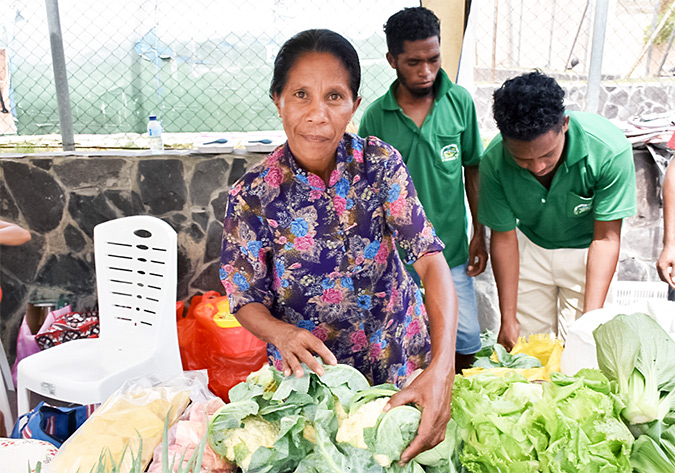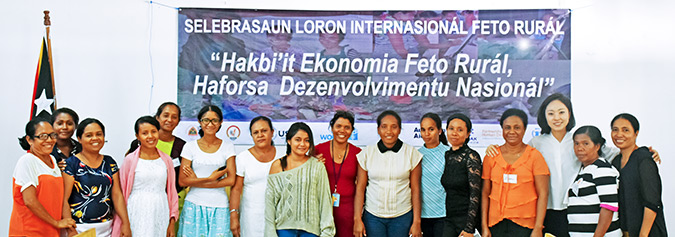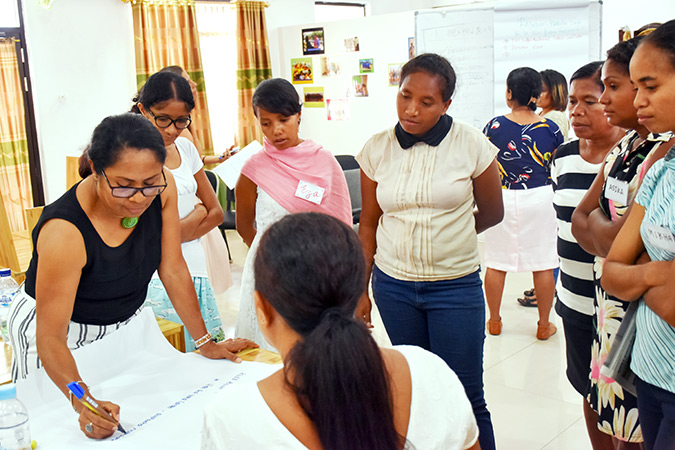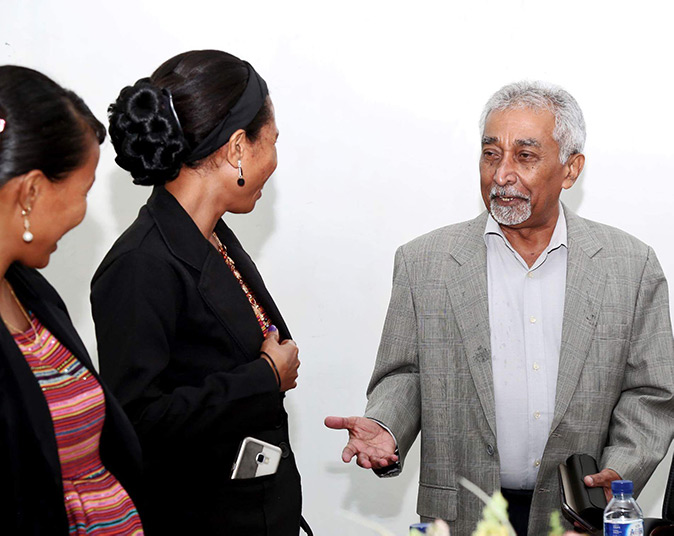The untapped potential to contribute: Rural women report on implementation of the 2015 Maubisse Declaration
Date:
Author: Felix Maia
"Women in rural areas have a great potential to contribute more. Sadly, these energies and potential had been wasted by not involving them", said Ana de Fatima Cunha.

Dili, Timor-Leste — Ana de Fatima Cunha, or Ana as she prefers to be called, was one of 12 women from 5 of Timor-Leste's 13 municipalities participating in a 2-day leadership training to build their advocacy skills as part of the commemoration of International Day for Rural Women on 15th October.
Ana is an entrepreneur from the Municipality of Bobonaro on the western border of Timor-Leste. She owns a civil construction company that she founded in 2008. Her company is focused on the maintenance of roads across the mountainous terrain of the municipality, which importantly employs women in the male-dominated construction sector.
"In our municipality, we have seen women's participation in the area of road construction, especially in the maintenance of it. However, it is still very minimum" said Ana. "This is due to various factors, such as the skill gap between the women and men as well as the lack of willingness from the men to share the opportunity with women there", she continued.
Ana, along with other municipal representatives, gained skills for conducting planning, monitoring and analyzing the implementation of Maubisse Declaration, and prepared to present their recommendations with the National Parliament and Government to share on how the commitments can be fulfilled.
The Maubisse Declaration is a commitment by the Government of Timor-Leste signed on October 15th, 2015 by the former Prime Minister alongside 9 State institutions to take actions that would improve the lives of rural women by 2017, Representing disabled-persons organizations in the training, Veronica Tilman, the program manager at Raes Hadomi Timor Oan, shared her reflections on the commemoration of IDRW.

"Through the celebration of International Day for Rural Women, we can promote rural women and to recognize their contributions to the economy and employment, as they also take part in various parts of development, including also those who are physically disabled"
Veronica stated that she was happy to see people taking more steps to recognize rural women's contribution to the country's development in various aspects, and has high hope that there would be more improvements for other women, particularly in rural areas.
"I see that gender equality is gaining more momentum, nowadays", she observed. "All this time, rural women tend to be at the back. As a woman, I would like to take this opportunity to bring forth rural women's issues to the table and to be discussed at the national level".
The training followed consultations with rural women in the 5 municipalities, with efforts to include women with disabilities, organized by the national women's network Rede Feto along with UN Women, and the Australian-funded Partnership for Human Development and agriculture-focused TOMAK programmes.
"Women in rural areas have a great potential to contribute more", said Ana, stressing inadequate participation of rural women in development, and although there is a huge potential that can be tapped into, "..sadly, these energies and potential had been wasted by not involving them", Ana continued.

Teresa Teixeira, another participant, is a civil servant working at Ministry of Education in the eastern city of Baucau. She manages data collected from all teachers in the municipality to monitor progress from schools and teacher performance. Despite coming from different municipalities, Teresa shared Ana's opinion on how to address this issue-provide more opportunities for women to increase their skills and knowledge across sectors.
"This way they can fully participate, also, in the decision making. In particular, giving them opportunities for leadership training can prepare them to be good leaders, as making decisions is not easy, and it requires a lot of information and preparations", Teresa explained.
She also continued, "We also need to see that each line ministry that had signed the Maubisse Declaration will allocate the necessary financing to be able to build the capacity of rural women."
Recalling the relevance of the Declaration, Sunita Caminha, Head UN Women's Office in Timor-Leste, noted "It was the first joint Government commitment dedicated to improve the lives of rural women, with important targets that recognized the need to uphold the rights and harness the potential of rural women through increasing targeted investments in agriculture production, and improving women's access to markets, among other priorities".

The 2017 celebration of International Day for Rural Women in Timor-Leste, with the theme "Empowering Rural Women, Strengthening National Development", comprised various activities spanning weeks. It consisted of a market of local products from 14-15 October, community consultations in the 5 municipalities, a 2-day leadership training and culminated in a dialogue between 6 women representing the rural areas consulted with the Prime Minister on their experiences and recommendations for future action, which took place on 22 November 2017.
These activities are the result of the collaboration between Rede Feto, the Secretary of State for Gender Equality and Social Inclusion (SEIGIS), UN Women, WFP, USAID AVANSA, and the Government of Australia's programmes TOMAK and Partnership for Human Development.